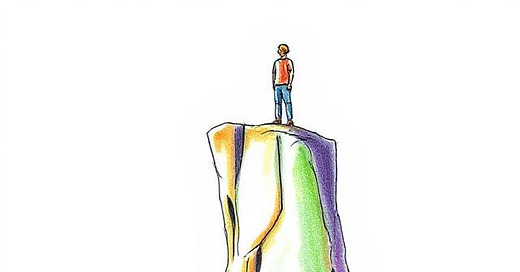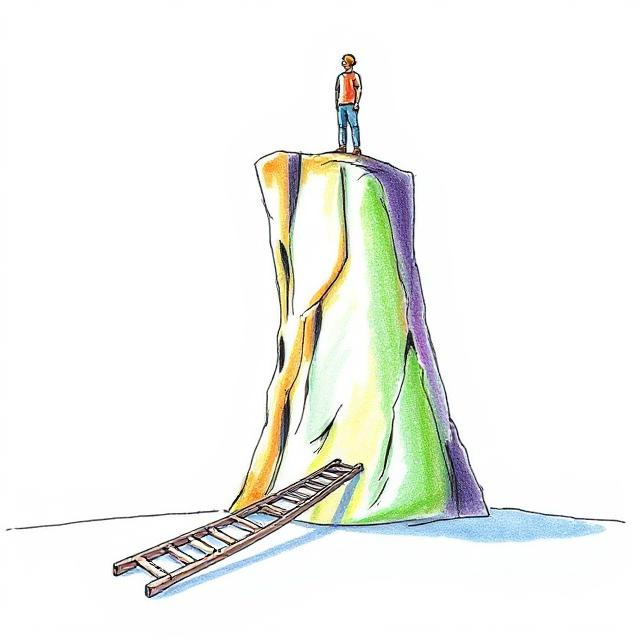Throwing Away the Ladder: The Tragedy of Killing What We Still Need
How Modern Thought Relies on Foundations It Publicly Rejects
I. Introduction: The Ladder We All Use
Modern culture is haunted by a paradox. We celebrate autonomy, reject absolute truths, and deconstruct inherited meaning—while still appealing to reason, justice, science, and human rights. Like a person who climbs a ladder to escape a flood, we depend on a structure to rise—but once safe, we decide the ladder is unnecessary. So, we kick it away.
This isn’t just ironic. It’s suicidal.
The ladder—our inherited metaphysics, belief in a moral order, the idea of objective truth—was never decoration. It was structural. It held up the entire worldview. Nietzsche, in his infamous pronouncement “God is dead,” warned not of atheism’s triumph but of civilization’s coming vertigo.
We are now living in that dizziness: a world that still uses the benefits of transcendence while denying its source.
II. Nietzsche’s Death Announcement Was Not a Victory Cry
In The Gay Science, Friedrich Nietzsche writes:
“God is dead. God remains dead. And we have killed him.”
It is one of the most misunderstood statements in philosophy. Nietzsche wasn’t simply claiming that people stopped believing in God. He was warning that Western civilization had removed the foundation of its entire structure—and was still pretending the house would stand.
The moral values, scientific optimism, and cultural narratives of Europe were built on a metaphysical reality—namely, that there existed a truth above man that gave meaning to reason, morality, and human worth.
By declaring God dead, Nietzsche was sounding the alarm: you’ve destroyed the absolute standard, yet you keep living as if it's still there.
III. What the Ladder Represents
The “ladder” in this analogy is everything that enables coherent thought and shared meaning:
The belief that truth exists independent of human opinion.
The idea that morality is more than preference—that right and wrong are not invented but discovered.
The trust in reason as a valid path to knowledge.
The view that human beings have intrinsic dignity.
Each of these concepts requires a foundation outside the human mind. They only make sense if there is something higher to ground them—something like objective reality, or in traditional terms, God.
You can’t justify justice from evolutionary advantage.
You can’t derive moral worth from particles.
You can’t validate reason using only the tools of reason itself.
As Gödel showed in mathematics, no system can prove itself fully from within. You always need something outside—something stable, transcendent, real.
IV. The Modern Contradiction: Wanting the Fruit Without the Root
Despite this, modern ideologies insist that we no longer need metaphysics or God. We can “build our own meaning.” But what does that mean?
We still demand:
Human rights
Scientific truth
Moral progress
Rational debate
Political justice
Yet these demands silently assume the very objectivity we now reject. It’s like using a map while denying the existence of geography.
This is the crisis of secular modernity:
We want the inheritance of a theistic worldview—but without the Giver.
We want the ladder to vanish once we’ve climbed it. But we forget: the height we reached was only possible because the ladder was there.
V. The Psychological Cost: Cynicism and Exhaustion
As this contradiction deepens, so does our despair. People are not stupid—they sense the hollowness.
If truth is relative, why fight for justice?
If morality is preference, why feel guilt?
If reason is just a human construct, why trust it?
The result is not liberation, but exhaustion. The modern self becomes morally hyperactive but philosophically unanchored—demanding justice, authenticity, and meaning while denying any ground for them to stand on.
We demand purpose while mocking the idea of a Purpose-Giver.
We demand identity while rejecting the possibility of design.
We call for peace while denying the possibility of transcendence.
It’s like begging for sunlight after shattering the sky.
VI. Recovering the Ladder: A Way Forward
The solution is not to uncritically revert to inherited traditions or adopt religion out of fear or habit. It means we must carefully and rationally reconstruct the foundations of truth. It’s not about going backward into blind faith, but forward into clarity.
This calls for:
Re-admitting that objectivity must exist outside the system to be real.
Understanding that truth cannot be invented, only discovered.
Acknowledging that reason requires a source beyond human bias.
Recognizing that morality must be more than consensus.
Confronting the fact that the “death of God” leads not to freedom but to free fall.
This is not a plea for dogma. It is a plea for coherence. And it requires deep thought, not shallow nostalgia.
VII. Conclusion: You Can’t Climb Without a Ladder
Modern culture is like a man in midair, flailing for stability after kicking away the very thing that held him up. He wanted the view without the climb. But reality doesn’t work like that.
If we want meaning, reason, and justice to remain real, we must restore the foundation that makes them possible. We must stop throwing away the ladder.
Or, to rephrase Nietzsche’s warning:
“You have unchained the earth from its sun. Are you not drifting now, as through an infinite nothing?”
We are drifting. But it’s not too late to build again—not with slogans, but with truth that exists whether we like it or not.
Because in the end, the ladder was never holding us back.
It was the only thing keeping us from the abyss.






Thank you for sharing this with me. 💙